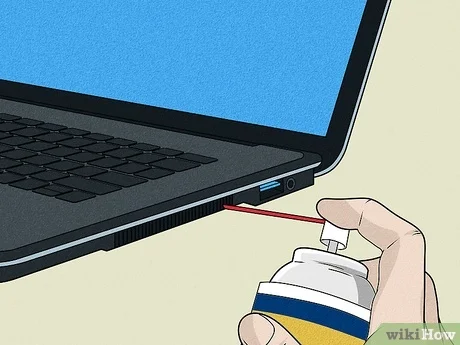Laptops are important for children today, whether they’re used for learning, playing games, or entertainment. However, kids may not always be careful with their devices, making laptops prone to physical damage.
This guide explains Protecting your child’s laptop from physical damage is important. Use a strong case, add a screen protector, teach careful handling, and store it safely to help keep the laptop in good condition.
Why Should You Protect Your Child’s Laptop?

Laptops are an investment. When it comes to children using them, accidents are almost inevitable. Whether it’s being dropped, knocked over, or having something spilled on it, protecting the laptop from physical damage is crucial to keeping it in good working order for years to come.
A damaged laptop can result in expensive repairs, data loss, or even the need for a replacement. Additionally, a damaged device can disrupt your child’s ability to complete homework or participate in online classes.
What Are the Common Causes of Laptop Damage?
Before discussing protection tips, it’s essential to understand the common causes of laptop damage:
- Drops and falls: Kids often handle laptops carelessly, making them prone to being dropped or knocked off surfaces.
- Spills: Whether it’s water, juice, or soda, liquid spills can ruin a laptop’s internal components.
- Excessive pressure: Putting heavy objects on top of the laptop or sitting on it can cause screen or structural damage.
- Rough handling: Forcefully opening or closing the laptop lid can damage hinges and screens.
- Overheating: Blocking ventilation by placing the laptop on soft surfaces like beds or couches can lead to overheating, damaging internal components.
Also Read: The Best Laptops For Dual Hard Drive Setup – Maximize Speed and Storage!
How to Protect Your Child’s Laptop from Physical Damage?
Invest in a Sturdy Laptop Case:
A well-padded laptop case is one of the simplest and most effective ways to protect your child’s device. Look for a durable, shock-absorbent case designed specifically for laptops. These cases offer protection against bumps, drops, and knocks, minimizing the chances of physical damage when carrying the laptop around.
Use a Laptop Screen Protector:
Laptops are especially vulnerable to screen damage, such as scratches, smudges, or cracks. A screen protector provides a layer of defense, reducing the risk of scratches or minor impacts that could damage the screen. Screen protectors are inexpensive and easy to apply, making them a worthwhile investment.
Purchase a Keyboard Cover:
Keyboards are often exposed to dust, crumbs, and spills, especially when children use laptops for both work and play. A silicone keyboard cover acts as a protective layer, keeping debris out and preventing liquids from seeping into the keyboard. It can easily be removed and cleaned, maintaining the cleanliness of the laptop.
Use a Protective Sleeve:
If your child carries their laptop to school or between rooms at home, using a protective laptop sleeve is essential. Sleeves provide additional padding and help cushion the device against sudden impacts. They’re lightweight and can easily fit into a backpack, offering extra protection during transport.
Create a Designated Laptop Space:
To minimize accidents, set up a specific area for your child to use their laptop. This space should be a flat, stable surface such as a desk or table, where the risk of the laptop being knocked off or damaged is low. Avoid using the laptop on beds, couches, or any uneven surfaces where it could fall or overheat.
Why It’s Important to Protect a Child’s Laptop?

Due to their fragility, laptops are prone to damage. Children may accidentally drop them, spill liquids on them, or scratch the screens. Protecting a laptop not only saves money on repairs but also ensures your child can use it for a longer time without issues.
Taking preventive steps to shield the laptop from physical harm can make a big difference in keeping it functional and safe. Additionally, a well-protected laptop can help your child avoid disruptions in their schoolwork or online activities.
It also gives you peace of mind, knowing that the device is less likely to suffer costly damage.
What Should You Avoid to Prevent Laptop Damage?
Preventing damage goes beyond using protective gear. There are certain habits and environments that can increase the risk of damaging your child’s laptop:
Avoid placing food and drinks near the laptop:
Spills are one of the leading causes of laptop damage. Even a small spill can result in internal short-circuiting or permanent damage to the keyboard and touchpad. Encourage your child to use their laptop in a designated study space free of food and drinks. If a snack is necessary, make sure it’s consumed far from the laptop, and only water should be allowed, as it is easier to clean in case of an accident compared to sugary drinks like juice or soda.
Also Read: How Much Is My Hp Laptop Worth – Check Its Value!
Don’t overcharge the laptop:
Consistently leaving the laptop plugged into the charger after it reaches full battery capacity can degrade the battery over time, reducing its efficiency and lifespan. Educate your child about charging habits, such as unplugging the laptop once it reaches 100% and allowing the battery to drain to around 20-30% before recharging. This helps preserve the battery’s health in the long run.
Keep the laptop away from extreme temperatures:
High heat or extreme cold can damage the laptop’s internal components, including the battery and motherboard. For instance, using the laptop in direct sunlight or leaving it inside a hot car can lead to overheating. Conversely, cold temperatures can cause condensation, which may harm the internal circuits. Make sure your child avoids using the laptop outdoors in extreme weather and that it is stored in a temperature-controlled environment, ideally between 50°F and 95°F (10°C to 35°C).
Avoid using the laptop on uneven surfaces:

Placing the laptop on soft surfaces like couches, beds, or even pillows can block ventilation, causing the device to overheat. Overheating can lead to serious damage to the CPU and other hardware. Encourage your child to always use their laptop on a flat, hard surface, such as a desk or table, where proper airflow is maintained. You can also invest in a cooling pad to enhance airflow if your child likes working from different areas around the house.
Avoid stacking heavy items on the laptop:
It’s not uncommon for children to pile books, toys, or other objects on top of their laptop without realizing the potential damage. Excess weight can cause cracks in the screen or stress on the hinges, leading to a malfunctioning display. Teach your child to keep their laptop in a safe, clutter-free area where heavy items won’t be placed on it.
How to Handle Laptop Damage?
Even with all the protective measures in place, accidents can happen. Here’s what to do if your child’s laptop is damaged:
- Screen damage: If the laptop screen is cracked, refrain from using it to avoid further damage. Seek professional repair services or use the warranty if applicable.
- Water damage: If liquids spill on the laptop, immediately turn it off, unplug it, and remove the battery (if possible). Dry it thoroughly and take it to a professional for repair.
- Hardware issues: If your child experiences performance issues after dropping the laptop, there may be internal damage. Have a technician inspect the device to prevent further issues.
Also Read: Where To Sell My HP Dragonfly Pro Laptop – Quick Guide!
FAQ’s:
1. What Is the Best Type of Case for a Child’s Laptop?
A sturdy, shock-absorbent laptop case with padding is ideal. It protects against drops, bumps, and knocks, ensuring the laptop stays safe during daily use and transport.
2. Can a Laptop Sleeve Prevent Damage?
Yes, a protective laptop sleeve adds extra padding and protects the laptop from impacts when carried in backpacks or handled between rooms.
3. Should I Get a Warranty for My Child’s Laptop?
Investing in a warranty or insurance plan is helpful. It can cover repairs for accidental damage like drops or spills, reducing costly repairs.
4. How Often Should You Clean a Laptop?
Cleaning the laptop’s keyboard, screen, and vents every few weeks helps prevent dust buildup and ensures it remains functional over time.
5. Is It Safe for Kids to Use Laptops on Their Beds?
No, using a laptop on soft surfaces like beds can block ventilation, causing overheating. Encourage kids to use laptops on flat, hard surfaces to prevent damage.
Conclusion:
Protecting your child’s laptop from physical damage is crucial for maintaining its longevity and functionality. By using a sturdy case, applying a screen protector, teaching proper handling techniques, and setting up a designated workspace, you can significantly reduce the risk of accidents.
Additionally, using accessories like keyboard covers and cooling pads can offer extra protection. Taking these preventive measures not only saves money on repairs but also ensures your child can use their laptop for learning and entertainment without disruption.



